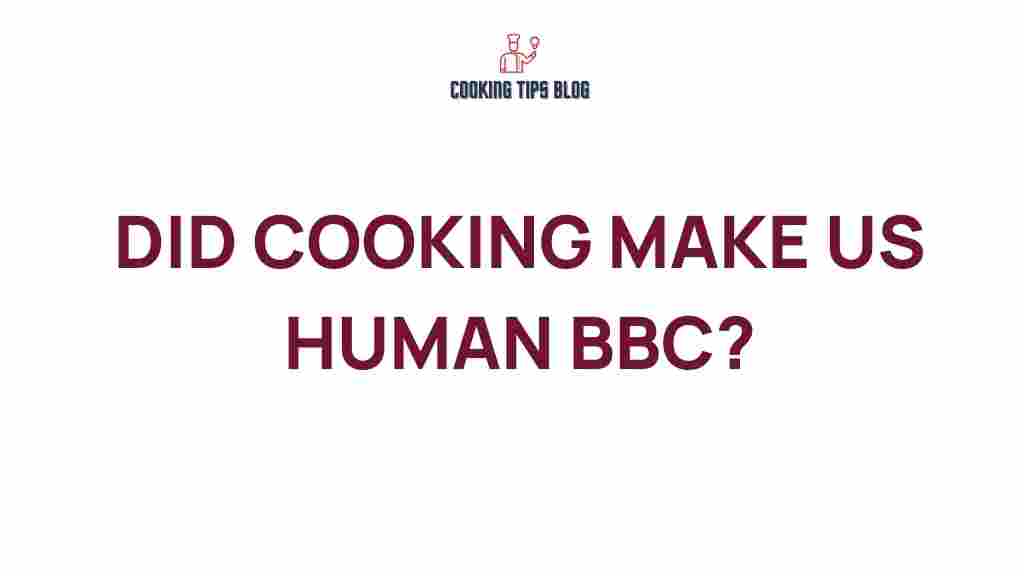Did Cooking Shape Our Humanity? The Surprising Link Revealed
The intricate relationship between cooking and humanity is both fascinating and profound. Throughout history, cooking has played a pivotal role in shaping human evolution, social structures, and even our biology. But how did this simple act of preparing food become a cornerstone of our identity as a species? Let’s delve into the remarkable journey of cooking and explore its significant impact on human development.
The Evolution of Cooking
Cooking is not merely a means to satisfy hunger; it has been a transformative force in human evolution. The origins of cooking are believed to date back over a million years, with evidence suggesting that early humans learned to control fire and use it to prepare food. This innovation led to several crucial developments:
- Enhanced Nutritional Value: Cooking food increases its nutritional value by breaking down tough fibers and making nutrients more accessible.
- Increased Caloric Intake: Cooked food provides more calories than raw food, which could have been a crucial factor for early humans needing energy for survival.
- Food Safety: Cooking reduces the risk of foodborne illnesses by killing harmful bacteria and parasites.
These advantages likely contributed to the development of larger brains in our ancestors, as a higher caloric intake supported cognitive growth. This begs the question: did cooking shape our humanity in more ways than one?
The Social Aspect of Cooking
Cooking has always been a communal activity, fostering social bonds among individuals. In prehistoric times, gathering around a fire to share a meal was not just about nutrition; it was a ritual that reinforced social connections. Here are some social implications of cooking:
- Community Building: Shared meals create a sense of belonging and encourage teamwork.
- Communication Enhancements: Cooking together fosters communication skills and collaboration.
- Cultural Identity: Traditional cooking practices help preserve cultural heritage and identity.
As societies evolved, so did the complexity of cooking. The development of culinary traditions and practices became intertwined with cultural identity, marking the importance of cooking in human civilization.
The Science Behind Cooking
From a scientific perspective, cooking alters the molecular structure of food. This transformation not only makes food tastier but also impacts our health and wellbeing. Here are some key scientific aspects of cooking:
- Maillard Reaction: This chemical reaction between amino acids and reducing sugars gives cooked food its distinctive flavor and color.
- Nutrient Preservation: Certain cooking methods, like steaming, may preserve more nutrients compared to boiling.
- Digestibility: Cooking softens food, making it easier for our bodies to digest and absorb nutrients.
The science of cooking is a rich field of study, and its implications extend beyond the kitchen. Understanding how cooking affects the food we eat can empower us to make healthier choices.
Cooking and Human Health
As cooking has evolved, so too have our dietary habits. The way we prepare food can significantly impact our health. Here are some ways in which cooking influences our health:
- Weight Management: Homemade meals are often healthier and lower in calories compared to processed foods.
- Chronic Disease Prevention: Cooking with whole, fresh ingredients can reduce the risk of chronic diseases such as obesity, diabetes, and heart disease.
- Food Preferences: Cooking can shape our taste preferences, often leading to healthier choices.
By understanding the connection between cooking and health, we can embrace cooking as a tool for improving our overall wellbeing.
Step-by-Step Process to Embrace Cooking in Your Life
If you’re looking to incorporate more cooking into your life, here’s a step-by-step process to get started:
Step 1: Assess Your Skills
Evaluate your current cooking skills and identify areas for improvement. Whether you’re a beginner or an experienced cook, there’s always room to learn.
Step 2: Start Simple
Begin with simple recipes that require minimal ingredients and techniques. Gradually challenge yourself with more complex dishes.
Step 3: Explore Different Cuisines
Dive into different culinary traditions. Exploring global cuisines can enhance your cooking repertoire and introduce you to new flavors.
Step 4: Invest in Quality Tools
Equip your kitchen with essential cooking tools and utensils. Quality cookware makes cooking easier and more enjoyable.
Step 5: Make Meal Planning a Habit
Plan your meals for the week to save time and reduce food waste. This practice will encourage you to cook regularly.
Step 6: Embrace Experimentation
Don’t be afraid to experiment with ingredients and techniques. Cooking is an art, and creativity is key!
Troubleshooting Common Cooking Issues
Even experienced cooks can encounter problems in the kitchen. Here are some common cooking issues and their solutions:
- Overcooked Vegetables: Try blanching vegetables in ice water immediately after cooking to preserve their color and crunch.
- Undercooked Meat: Use a meat thermometer to ensure meat reaches the proper internal temperature.
- Burnt Sauces: If a sauce burns, try adding a little water to dilute the flavor and salvage it.
Remember, mistakes are part of the learning process. Each cooking mishap can provide valuable lessons!
Conclusion
In conclusion, the act of cooking is deeply interwoven with the fabric of humanity. From enhancing our nutritional intake to fostering social bonds and shaping our health, cooking has played a crucial role in our evolution. As we embrace the culinary arts in our daily lives, we not only nourish our bodies but also connect with our heritage and community.
So, the next time you step into the kitchen, remember that cooking is more than just a chore; it is a celebration of humanity’s journey. For more insights on cooking and health, check out this comprehensive guide that explores culinary techniques and nutrition.
By embracing cooking, we honor not just our own health but also the rich tapestry of human culture that has shaped our world. Happy cooking!
This article is in the category Basic and created by Cookingtipsblog Team
